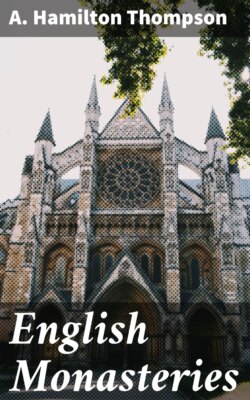Читать книгу English Monasteries - A. Hamilton Thompson - Страница 26
На сайте Литреса книга снята с продажи.
§ 23.
ОглавлениеTable of Contents
The position of monasteries as landowners naturally led to some slackening of the rule. Abbots and priors of the larger houses took their place among the spiritual barons of the realm. From the fourteenth century to the suppression twenty-four Benedictine and three Augustinian abbots, with the prior of Coventry and the English prior of the knights hospitallers, had a prescriptive right to seats in parliament. These are sometimes confounded with 'mitred' abbots: the right, however, of an abbot or prior to wear episcopal insignia depended, not upon a parliamentary summons, but upon a privilege granted by the pope. In addition to the extra-monastic duties thus incumbent upon certain heads of houses, the care of large estates took many of the brethren away from constant attendance in their house. When bishop Alnwick of Lincoln visited Peterborough abbey in 1437, he found that out of 44 monks there were seldom on ordinary days more than ten or twelve at any service in church. The obedientiaries or officers who looked after the chief departments of the convent came to church only on great festivals: some monks lived upon the abbey granges: every week at least seven were on furlough for blood-letting: two were at their studies at Oxford: several were old and infirm and could not attend service regularly. The somewhat trite remark of the cellarer at Leicester in 1440 that 'abundance of money is the cause of many evils' is justified over and over again in the records of episcopal visitations. In spite, however, of their wealth, even the richest houses, as a rule, were beset by money difficulties. Their expenses were great: hospitality and the daily alms were a serious drain on income: pensions and corrodies or shares in the common revenue were too liberally granted to outsiders: there was much necessary outlay on property: young monks had sometimes to be maintained in hostels belonging to monasteries at the universities: an ambitious abbot might run his house into extravagant expense on buildings: episcopal visitations meant a large fee to the bishop and expense upon his entertainment. The improvidence of officers, joined with the damage caused to property by pestilence and storm, constantly reduced monasteries to a state of bankruptcy. The heavy debts of monasteries, their insufficient assets, the irregularity with which accounts were rendered, and the consequent decay of discipline are abundantly illustrated in the registers of fourteenth and fifteenth-century bishops and in the patent rolls of the reigns of Henry V and Henry VI.
